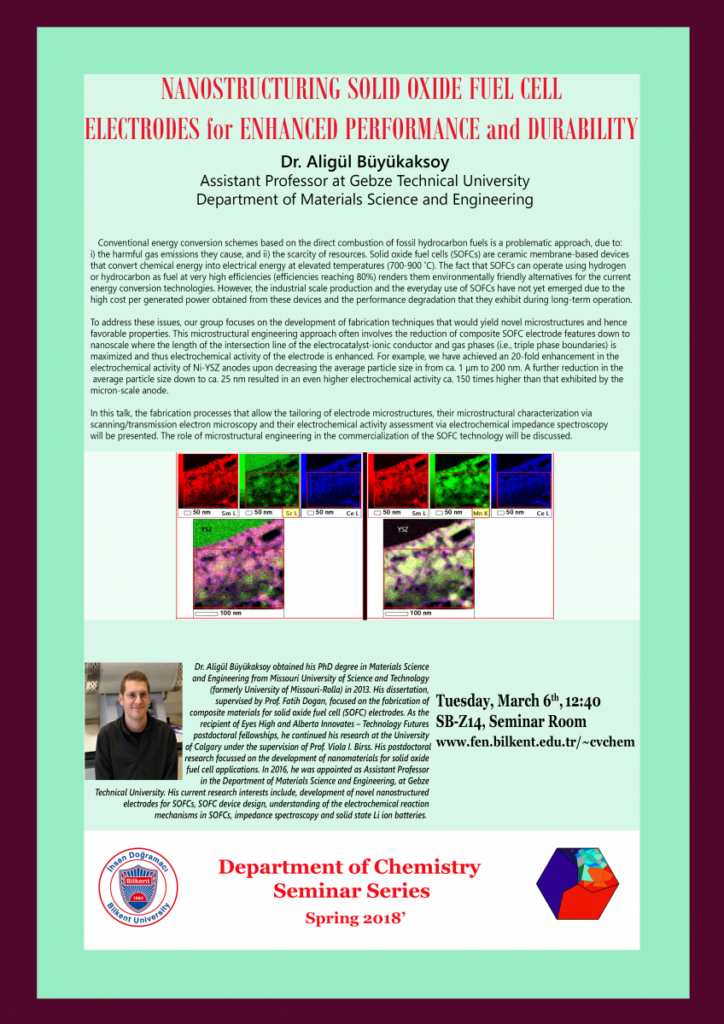Spring '18 Department Seminars with Dr. Aligül Büyükaksoy
Title: Nanostructuring Solid Oxide Fuel Cell Electrodes for Enhanced Performance and Durability
Speaker: Dr. Aligül Büyükaksoy
Department of Materials Science and Engineering, Gebze Technical University
Kocaeli, Türkiye
Date: March 6, 2018, Tuesday
Time: 12:40
Place: Departmental Seminar Room (SB-Z14)

Abstract:
Conventional energy conversion schemes based on the direct combustion of fossil hydrocarbon fuels is a problematic approach, due to: i) the harmful gas emissions they cause, and ii) the scarcity of resources. Solid oxide fuel cells (SOFCs) are ceramic membrane-based devices that convert chemical energy into electrical energy at elevated temperatures (700-900 °C). The fact that SOFCs can operate using hydrogen or hydrocarbon as fuel at very high efficiencies (efficiencies reaching 80%) renders them environmentally friendly alternatives for the current energy conversion technologies. However, the industrial scale production and the everyday use of SOFCS have not yet emerged due to the high cost per generated power obtained from these devices and the performance degradation that they exhibit during long-term operation. To address these issues, our group focuses on the development of fabrication techniques that would yield novel microstructures and hence favorable properties. This microstructural engineering approach often involves the reduction of composite SOFC electrode features down to nanoscale where the length of the intersection line of the electrocatalyst-ionic conductor and gas phases (i.e., triple phase boundaries) is maximized and thus electrochemical activity of the electrode is enhanced. For example, we have achieved an 20-fold enhancement in the electrochemical activity of Ni-YSZ anodes upon decreasing the average particle size in from ca. 1 μm to 200 nm. A further reduction in the average particle size down to ca. 25 nm resulted in an even higher electrochemical activity ca. 150 times higher than that exhibited by the micron-scale anode.
In this talk, the fabrication processes that allow the tailoring of electrode microstructures, their microstructural characterization via scanning/transmission electron microscopy and their electrochemical activity assessment via electrochemical impedance spectroscopy will be presented. The role of microstructural engineering in the commercialization of the SOFC technology will be discussed.
Short Biography of the Speaker:
Dr. Aligül Büyükaksoy obtained his PhD degree in Materials Science and Engineering from Missouri University of Science and Technology (formerly University of Missouri-Rolla) in 2013. His dissertation, supervised by Prof. Fatih Dogan, focused on the fabrication of composite materials for solid oxide fuel cell (SOFC) electrodes. As the recipient of Eyes High and Alberta Innovates – Technology Futures postdoctoral fellowships, he continued his research at the University of Calgary under the supervision of Prof. Viola I. Birss. His postdoctoral research focussed on the development of nanomaterials for solid oxide fuel cell applications. In 2016, he was appointed as Assistant Professor in the Department of Materials Science and Engineering, at Gebze Technical University. His current research interests include, development of novel nanostructured electrodes for SOFCS, SOFC device design, understanding of the electrochemical reaction mechanisms in SOFCs, impedance spectroscopy and solid state Li-ion batteries.